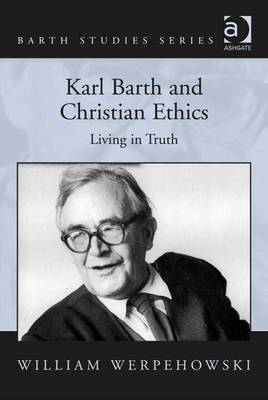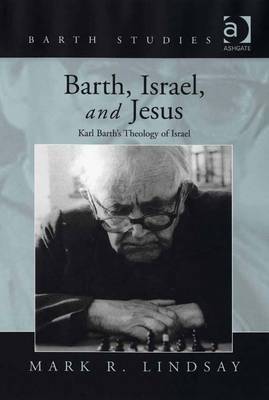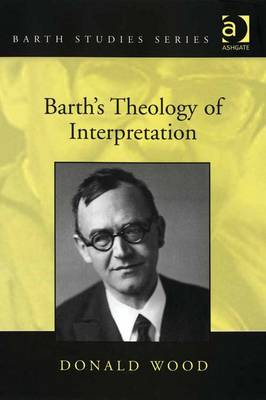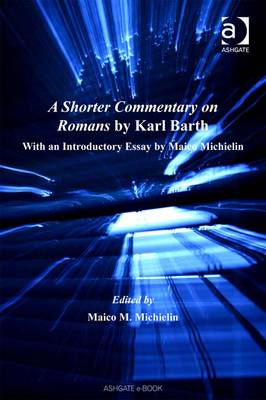Barth Studies
4 total works
This critical study of Karl Barth's Christian theological ethics discusses Barth's controversial and characteristically misunderstood ethics of divine command. The surprising relation of his 'divine command ethics' to contemporary 'narrative theology' and 'virtue ethics' and specific moral themes concerning bonds between parents and children, the nature of truth telling,...
Read moreThis critical study of Karl Barth's Christian theological ethics discusses Barth's controversial and characteristically misunderstood ethics of divine command. The surprising relation of his 'divine command ethics' to contemporary 'narrative theology' and 'virtue ethics' and specific moral themes concerning bonds between parents and children, the nature of truth telling, and the meaning of Christian love of God and neighbor are all discussed. This book reveals Barth's richness, depth, and insight, and places his work in constructive connection with salient themes in both Catholic and Protestant ethics.
Attentive to the fullness of Barth's Christological vision and to the purposes and limits of his reflections on the Christian life in pursuit of the good, William Werpehowski also advances conversations in Christian ethics about the nature of practical deliberation and decision, the orientation and dispositions that embody moral faithfulness, and the question and features of 'natural morality.'
The attitude of Karl Barth to Israel and the Jews has long been the subject of heated controversy amongst historians and theologians. The question that has so far predominated in the debate has been Barth's attitude, both theologically and practically, towards the Jews during the period of the Third...
Read moreThe attitude of Karl Barth to Israel and the Jews has long been the subject of heated controversy amongst historians and theologians. The question that has so far predominated in the debate has been Barth's attitude, both theologically and practically, towards the Jews during the period of the Third Reich and the Holocaust itself. How, if at all, did Barth's attitudes change in the post-war years? Did Barth's own theologising in the aftermath of the Holocaust take that horrendous event into account in his later writings on Israel and the Jews? Mark Lindsay explores such questions through a deep consideration of volume four of Barth's Church Dogmatics, the 'Doctrine of Reconciliation'.
Barth's Theology of Interpretation
by Donald Wood, Dr. Hans-Anton Drewes, Professor George Hunsinger, and Revd Prof. John Webster
Through his single-minded insistence on the priority of the Bible in the life of the church, Karl Barth (1886-1968) decisively shaped the course of twentieth-century Christian theology. Drawing on both familiar texts and recently published archival material, Barth's Theology of Interpretation sheds new light on Barth's account of just...
Read moreThrough his single-minded insistence on the priority of the Bible in the life of the church, Karl Barth (1886-1968) decisively shaped the course of twentieth-century Christian theology. Drawing on both familiar texts and recently published archival material, Barth's Theology of Interpretation sheds new light on Barth's account of just what it is that scripture gives and requires. In tracing the movement of Barth's earlier thinking about scriptural reading, the book also raises important questions about the ways in which Barth can continue to influence contemporary discussions about the theological interpretation of scripture.
A Shorter Commentary on Romans by Karl Barth
by Karl Barth, Maico M. Michielin, and David H.Van Daalen
First published in 1959, Karl Barth's A Shorter Commentary on Romans originated as the manuscript for a course of extra-mural lectures held in Basle during the winter of 1940-41. During this time, Barth continued to resist the Nazi regime and its influence on the Reformed Church as he did...
Read moreFirst published in 1959, Karl Barth's A Shorter Commentary on Romans originated as the manuscript for a course of extra-mural lectures held in Basle during the winter of 1940-41. During this time, Barth continued to resist the Nazi regime and its influence on the Reformed Church as he did when he was in Bonn.
This reissue of Barth's A Shorter Commentary on Romans links to the renewed interest today in a 'theological' interpretation of Scripture. In response to the modern preoccupation with what lies behind the text (the author's context), and to a postmodern preoccupation with what lies in front of the text (the reader's context), both theologians and biblical scholars are asking the following questions: 'What is the relationship between the biblical text, interpreter and God?' 'Can the Bible be read both as an historical document and as a text that speaks to us today, and if so, how can it do so?' Barth's commentarial practice as exemplified in A Shorter Commentary on Romans answers these questions.
This book is presented in two parts: first, an introduction by Maico Michielin helping readers understand Barth's theological exegetical approach to interpreting Scripture and showing readers how to let Scripture address theological and ethical concerns for today; the main body of the book then follows - the republication of the original English translation by D.H. van Daalen of Barth's A Shorter Commentary on Romans.



